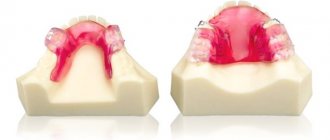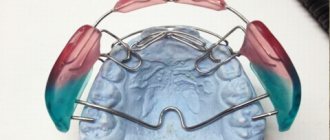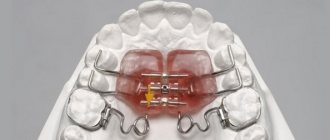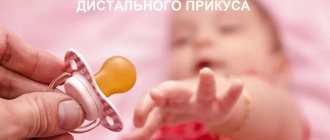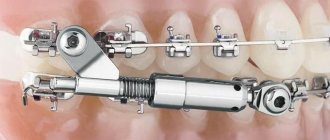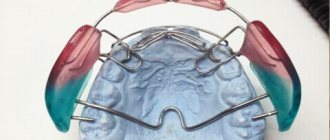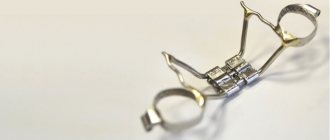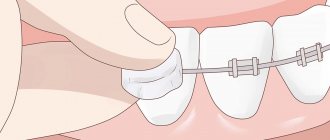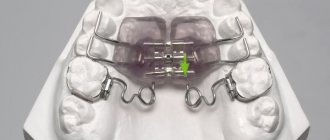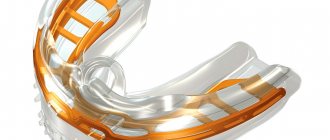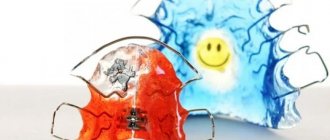4003
There are now many effective techniques for correcting orthodontic abnormalities. But, sometimes, a serious deviation in the development of the jaw arch is diagnosed, requiring special treatment. In such cases, the Brückl-Reichenbach apparatus is used, which is an effective device that brings the dentition to its normal position.
Device and principle of operation
The effect of the device is due to its special design. The classic version of the orthodontic device is a plate that accurately follows the relief of part of the palate and gums.
The plate is equipped with an inclined plane in the form of a semicircular arc, which plays the main corrective role. The arch is located in the area of the anterior group of teeth. The structure is installed using built-in clasps (loops), which are placed on the last molars.
photo: diagram of Brückl's apparatus
The operating principle of this design is based on the springy properties of the arch and the contractility of the muscles involved in chewing.
The whole correction process is as follows: while wearing it, the front teeth of the upper jaw touch the plate and are placed on it, which causes forceful pressure . Due to this effort, the lower crowns of the front row begin to gradually change their position, moving inward, and the upper ones towards the lips.
To maintain constant pressure, the dentist periodically corrects the acting arch, compressing it or stretching it.
Often, to increase the effectiveness of treatment, the dentist recommends using other orthodontic devices in conjunction with this device : a head cap, an extraoral elastic cord, a chin guard.
The listed additional elements will not only speed up the straightening process, but will also minimize the risk of the teeth returning to their previous position.
Clinic orthodontist - Ph.D. Ryabtseva Alla Alexandrovna
Work experience 12 years. Candidate of Medical Sciences with teaching experience. Doctor of the highest category.
Specializes in correcting malocclusions using removable (aligners, plates) and non-removable (braces) equipment. Successfully applies MEAW multi-loop arc technologies and miniscrews. Works with adults and children (from 3 years old). Successfully uses MEAW multi-loop arch technology, miniscrews and devices for jaw expansion according to Marco Rossa.
In 2008 she graduated from the Stavropol State Medical University, in 2009 from the North-Western State Medical University. I. I. Mechnikova (St. Petersburg), 2011 full-time graduate school, 2013 candidate of medical sciences. Since 2014, assistant at the Department of General Dentistry and Pediatric Dentistry at Stavropol State Medical University. Studied in the USA and Europe.
Purpose
This device is designed to normalize the position of teeth, both during the period of mixed and permanent dentition. But mainly it is prescribed to correct the bite of permanent teeth.
This is due to the fact that with a mixed bite, the jaw is not yet fully formed and more gentle methods can be used to straighten it .
The main indications for prescribing a Brückle appliance are the following orthodontic deviations:
- Deep bite in the lateral part of the dentition. The use of the device allows you to separate the tight fit of the crowns of opposite jaws.
- Mesial bite (gnathic form).
- Pronounced reverse incisal overlap, more than 3 mm deep.
- Inward displacement of the front row of teeth (palatal position of the crowns).
- Abnormal enlargement of the lower jaw.
- Macrodentia.
- Abnormal bite of neutral type.
- Prognathia of the lower jaw.
The decision on the advisability of using a Bruckle device to correct the bite in these pathologies is made only by the orthodontist.
How does a vestibular plate work?
Each plate has a “memory”, thanks to which the metal arcs still return to their original positions. This is important in the process of correcting the bite, when the arch “moves” the patient’s jaw bones and teeth to the required correct parameters. The orthodontist’s task is to select a plate with metal elements of such thickness and tension force that it works effectively in each specific case.
The plate may also have a special “clasp” that corrects its position during the treatment period. The lock is tightened at certain intervals, thereby correcting the bite.
When is the record used?
- for the treatment of abnormal position of teeth (canines and incisors);
- to correct a situation where a patient has had a tooth removed that had erupted out of place;
- to obtain a healthy bite without removing healthy teeth.
Contraindications
The use of this device is not possible in all cases, as there are some restrictions. One of the main contraindications is the period of baby teeth. At this stage, the use of the device is considered too aggressive a measure, which may cause disruption of the correct formation of the jaws.
In addition, the device cannot be used to treat incisal overlap, the depth of which is less than 3 ml. The distal type of bite and crowding of the anterior teeth in the lower jaw are also contraindications.
Diseases of periodontal and dental tissue are considered relative contraindications. After they are eliminated, the device can be used.
Also, a temporary obstacle to installation will be the abnormal development of the frenulum of the lips and tongue . In this case, preliminary low-traumatic surgical intervention will be required.
Advantages and disadvantages
Like any other orthodontic device, this device has its advantages and disadvantages that distinguish it from other corrective devices.
Advantages:
- Unlike other devices, here the arc is not activated, but acts as a fixing element.
- Absence of occlusal type pads in the lateral sections of the device. This allows you to more effectively influence the jaw, helping to lengthen the dental alveolar arch.
- The plate can be removed and stored in a container at any time, so you can make it unnoticeable to others.
- When treating deep bites, this design showed the fastest effect.
- After treatment, the device can be used as a retention plate. To do this, you just need to cut off the inclined plane with a regular cutter and process the resulting sharp edges.
The disadvantages of the device include the following:
- High cost compared to similar designs.
- Duration of treatment.
- The need to use auxiliary elements.
- Constant adjustment. When using the Bruckle apparatus, adjustments are made once every two weeks.
- Also, one of the disadvantages is the fact that if it breaks down, you will have to wait for a new device to be made. And at this time, the dentition remains without pressure and the risk of reducing all effort to zero increases.
Main types of construction
Regardless of the method of fixation, the principle of action on teeth and other characteristics of orthodontic devices, all existing systems are divided into three main types. This classification is based on the practical purpose of the devices:
- preventive – preventing the occurrence of pathologies by restoring the functions of teeth and jaw muscles;
- therapeutic – eliminating already formed anomalies;
- retention – consolidating the result of previously carried out corrective measures.
Manufacturing stages
Treatment with this device requires its individual manufacture.
Before this, the dentist conducts an examination to identify all dental problems and a detailed study of malocclusion.
Only after a complete history collection does the orthodontist begin to manufacture the device.
The whole process is divided into several stages:
- Taking an impression using a special material from the lower and upper jaws.
- Casting a working model from the received impressions.
- Manufacturing of the main components: clasps and vestibular arch.
- Strengthening elements on a working plaster model of the jaw. If it is necessary to retract the cuts of the lower row, the model of the jaw is covered with a cement layer on the lingual side in the area of the adjacent crowns. The upper part of the alveolar ridge is covered in the same way.
- Based on the resulting temporary structure, a wax base and a corrective inclined plane are modeled. Modeling is carried out in such a way that the plane overlaps the crowns of the incisors by 1/3 of their height. For this purpose, an impression of the front row of teeth of the upper jaw is used.
- The assembled workpiece is completely plastered in a cuvette, and then the wax is melted, replacing it with plastic.
At the same stage, they often engage in the manufacture of a chin guard. To do this, take a universal wax model, heat it and apply it to the chin. While the wax has not hardened, the workpiece is pressed firmly against the surface for a minute. After hardening, the mouthguard is ready.
How to motivate children to wear an orthodontic plate?
- Demonstrate the result in 3D format so that a person sees his teeth after treatment and understands the importance of such changes;
- Convey all the benefits of wearing a plate: a beautiful face, clear speech, self-confidence, the ability to walk more often and attend clubs without missing out due to colds, straight and flawless teeth, proper development;
- It is important to approach treatment in a playful way, to perform myogymnastics in a fun format. The orthodontist will tell you about this when drawing up a treatment plan.
Installation and treatment
After production, the orthodontist invites the patient to install the device. The first installation is carried out directly by the doctor. He explains how the structure should be positioned correctly in the oral cavity and how the patient should feel.
Installation must be done on the lower row of teeth, so that the device does not touch the enamel of the crowns from their inner surface.
As a rule, treatment takes place in several stages:
- At the first stage, the device is used in conjunction with a rubber rod. The duration of treatment at this stage is 30 days for a temporary bite and 38 days for a permanent bite.
- The second stage begins when a neutral bite begins to form. The duration of treatment during this period for replacement teeth is 63 days, for permanent teeth 85 days. At this stage, the device is configured to expand the jaw arch.
- The third stage is final and is of a consolidating nature.
This implies the use not of the classic version of the Brückle apparatus, but of a retention one, that is, with a cut off vestibular plane. The duration of wearing a retention plate depends on the initial diagnosis and is determined by the dentist.
Throughout the treatment, it is necessary to regularly adjust the device. On average, this happens once every 2–3 weeks.
Price
The cost of the Brückle apparatus depends on the specific clinic, as it is manufactured individually. The average cost of the device itself is between 3 and 6 thousand rubles, but it is also necessary to take into account the costs of dental services.
As a rule, the manufacture and installation of the device costs patients approximately 10,000 rubles. Additionally, the cost of creating a wax impression and plaster cast, work on adjusting the device, and so on is taken into account. Manufacturing materials also affect the cost.
If the structure requires repairs due to improper handling and violation of medical recommendations, this service is paid for separately. It is not included in the total price of manufacturing, fitting and installation work.
Wearing and care
To obtain the desired effect from treatment, the device must be worn at least 20 hours a day .
In the first week after installation, it is not recommended to remove the structure even while sleeping and eating.
The best option would be to wear it constantly around the clock , allowing it to be removed only during meals and oral hygiene procedures.
It is recommended to use extraoral traction for 10 hours.
Throughout the use of the device, do not forget about proper care, because the general condition of the oral cavity depends on this .
Basic rules for caring for the device include the following recommendations:
- Cleaning the plate with a soft toothbrush must be done at least 2 times a day;
- for cleansing you need to use special aseptic gels, one of which is intended for daily use, the other is more powerful for 1 cleansing per week;
- during removal, the structure should be stored only in a special container;
- Once a week, soak the device in dental cleaning concentrate for 6–8 hours.
